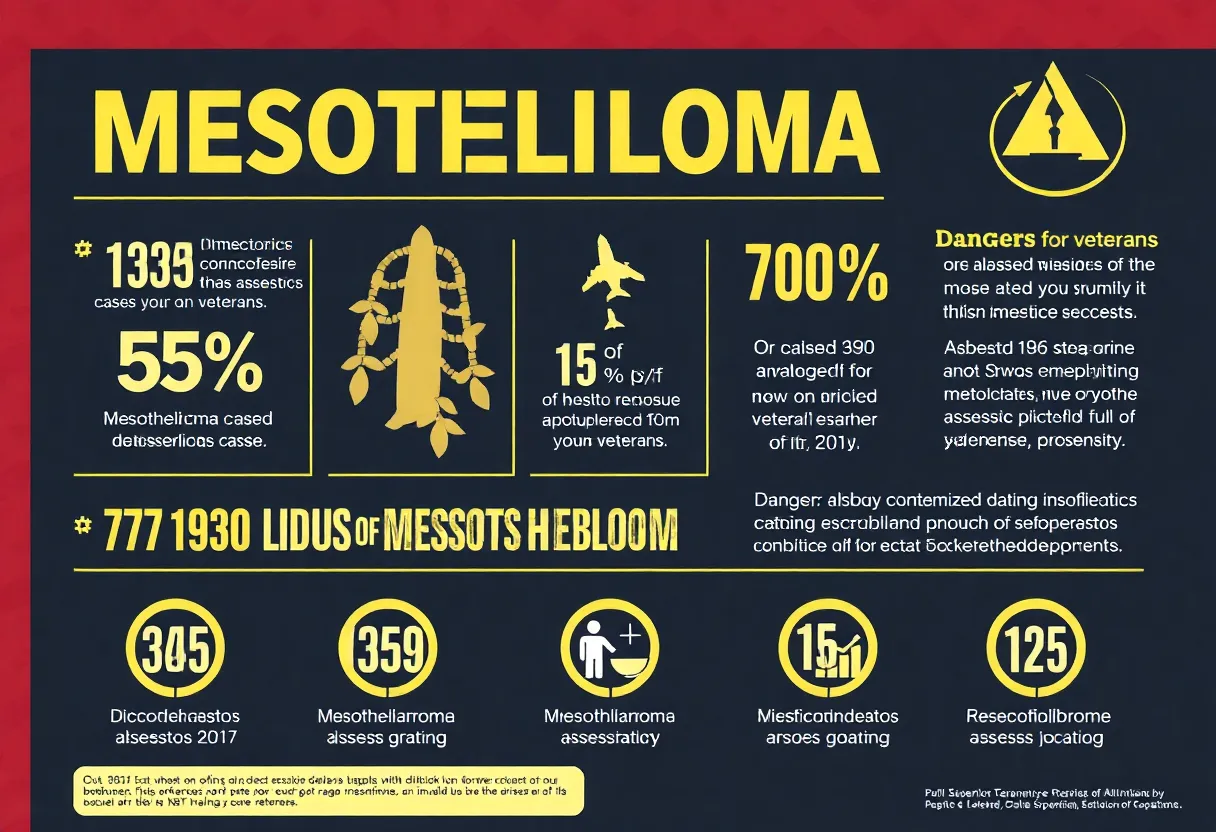News Summary
Mesothelioma, a rare but aggressive cancer, is primarily linked to asbestos exposure, affecting thousands of veterans annually. Learn about risks and recent initiatives.
The Alarming Truth About Mesothelioma and Asbestos Exposure: What You Need to Know
Mesothelioma, a rare but aggressive form of cancer, primarily results from exposure to asbestos. Despite its rarity, approximately 3,000 new cases of mesothelioma are diagnosed in the United States each year, with an alarming 900 cases occurring among veterans. This stark statistic highlights the ongoing dangers of a substance that was once widely utilized for insulation and fireproofing in military facilities across the globe.
The Military Connection
For decades, veterans have been unwittingly exposed to asbestos, particularly during the years when it was prevalent in military applications, peaking from the 1960s to the 1990s. Asbestos was hailed for its flame-retardant properties and used extensively in shipbuilding and construction. Unfortunately, this led to countless veterans contracting mesothelioma long after their service ended.
The Diagnosis Dilemma
Diagnosing mesothelioma presents a significant challenge, with misdiagnosis rates estimated between 14% and over 80%. Medical professionals often confuse mesothelioma with other lung cancers or even pneumonia, resulting in dangerous delays in treatment. These delays can allow the cancer to metastasize, worsening the patient’s prognosis and decreasing their chances for survival.
National Registry Initiative
Recognizing the critical situation, the CDC proposed the creation of a National Mesothelioma Registry in 2019. This initiative is aimed at addressing the high misdiagnosis rates and establishing case-finding methodologies for at-risk populations. With the goal of improving patient access to clinical trials and research initiatives, this registry could help save lives by facilitating early detection and treatment of mesothelioma.
Understanding Your Rights
The context of higher risk is further complicated by the fact that over 80% of mesothelioma cases are linked to professional exposure to asbestos. While only about 12% of cases result from genetic mutations, many individuals diagnosed with this disease may be entitled to claims from the government or companies that were negligent in handling asbestos. The PACT Act is one route available for veterans to file for benefits related to their condition; however, the evaluation process by the health commission can take up to four and a half months.
Survival Rates and the California Crisis
The survival rates for pleural mesothelioma, the most common type, are starkly low, typically falling below one year. Additionally, complications arising from misdiagnosis and long claim processing delays can further impair the quality of life for veterans. This public health issue is particularly acute in states like California, which has reported one of the highest rates of mesothelioma and asbestos-related deaths in the country.
Between 1999 and 2017, California recorded a staggering 27,080 asbestos-related deaths, with 5,100 attributed directly to mesothelioma. Recent data indicates that between 2015 and 2019, there were 317 documented mesothelioma deaths in the state. Contra Costa County alone accounted for 1,198 asbestos-related deaths, averaging 63 deaths per year.
A Lingering Legacy
Although California banned the use of asbestos-containing materials in 1977 and closed its last asbestos mine in 2002, the long latency period for mesothelioma means that new cases will continue to emerge. Individuals exposed to asbestos may not develop symptoms for decades, leading to ongoing efforts for better diagnosis and treatment protocols.
Hope on the Horizon
Enhancing diagnostic accuracy and streamlining claims processes for veterans could soon improve life expectancy rates through earlier interventions. The National Mesothelioma Registry represents a potential turning point for those affected by this devastating disease, facilitating quicker access to vital healthcare resources and maximizing outcomes for patients and their families.
In the battle against mesothelioma, awareness, early detection, and sustained advocacy are critical to changing the narrative around this form of cancer and the asbestos exposure that causes it.
Deeper Dive: News & Info About This Topic
HERE Resources
Significant Waste Crime Fines Handed Down in Woburn Sands
The Asbestos Crisis Continues: Report Reveals Chinks in the Armor of NSW’s Management Strategies
EPA Takes Decisive Action to Ban Asbestos Use in the U.S.
U.S. Announces Historic Asbestos Ban: What You Need to Know
The Future of Mesothelioma Treatment: A Positive Transformation
United Kingdom Braces for Legal Battle Over J&J Talc Claims
Rising Tide of Lawsuits: Women Take on Pharma Giants over Health Risks
Community Mourns the Loss of Jack Wayne Area
Shining a Light on Mesothelioma: The Orphan Cancer That’s Still Suffering in Silence
Breakthrough in Mesothelioma Treatment: FDA Approves New Combination Therapy



















